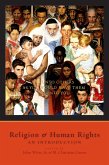The literature that explores the compatibility of Islam and human rights is torn between one approach that focuses on reinterpreting Islamic scripture and another that concentrates on reconfiguring Muslim sensibility. Since one cannot be understood without the other, both approaches fail to account for change within their respective domains. In Rethinking Islam and Human Rights, leading Islam and human rights scholar Ozcan Keles examines how social movement practice unknowingly and unintentionally produces Islamic knowledge on human rights (i.e., change) in both scriptural reinterpretation and societal disposition, through a focus on the interaction between the two. Rethinking Islam and Human Rights weaves together theoretical insights from a range of disciplines, while reworking process tracing methodology, to focus on a single case study analysis of the practices of the Hizmet movement (also known as the G?len movement) to flesh out the dynamics of this interactive change and the centrality of practice-based knowledge production therein. In doing so, Keles demonstrates how and why social movement practice organically, unassumingly, unintentionally and often, counter-intentionally, produces socially transformative formalized Islamic knowledge on human rights. He shows how it is possible to account for the production, assimilation, legitimization, and externalization of Islamic knowledge through a single relational process on some of the most intransigent issues: apostasy and women's rights. Consequently, this book offers an important pathway to re-assess age-old challenges at the cross-sectional impasse of change, stability, and religious knowledge production, which extends beyond those associated with Islam and human rights.
Dieser Download kann aus rechtlichen Gründen nur mit Rechnungsadresse in A, B, BG, CY, CZ, D, DK, EW, E, FIN, F, GR, HR, H, IRL, I, LT, L, LR, M, NL, PL, P, R, S, SLO, SK ausgeliefert werden.









